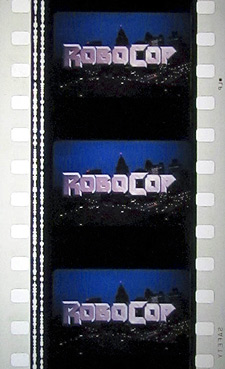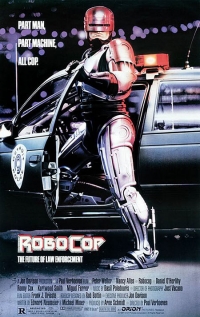“In many ways, RoboCop was ahead of its time, foreshadowing a future that is with us now. The Reagan-era gap between rich and poor has grown ever wider, with the 1% using an increasingly militarized police force to protect gentrified communities while other parts of cities have become postindustrial wastelands, abandoned to crime and drugs. RoboCop himself, a man made over into a machine by an unfeeling corporation, can be seen as a literal example of American workers being replaced by robots.” — Film scholar and Paul Verhoeven author Douglas Keesey
The Digital Bits and History, Legacy & Showmanship are pleased to present this retrospective commemorating the 30th anniversary of the release of RoboCop, Paul Verhoeven’s (Soldier of Orange, Basic Instinct) franchise-inspiring and Saturn- and Oscar-winning satirical action film starring Peter Weller (The Adventures of Buckaroo Banzai, Leviathan) and Nancy Allen (Dressed to Kill, Blow Out). [Read on here...]
RoboCop, which also featured Ronny Cox, Kurtwood Smith and Miguel Ferrer, opened in theaters 30 years ago this week. For the occasion The Bits features a compilation of statistics, trivia and box-office data that places the movie’s performance in context; passages from vintage film reviews; a reference/historical listing of the film’s Dolby SR presentations; and, finally, an interview segment with RoboCop: The Definitive History author Calum Waddell, who discuss the virtues and influence of RoboCop.

ROBOCOP NUMBER$
- 1 = Box-office rank among movies in the RoboCop franchise (adjusted for inflation)
- 1 = Number of Academy Awards (special achievement)
- 1 = Rank among top-earning movies during opening weekend
- 2 = Number of weeks nation’s top-grossing movie (weeks 1-2)
- 2 = Rank among top-earning movies of Orion’s 1987 slate
- 2 = Rank among top-earning science-fiction movies of 1987
- 2 = Number of Academy Award nominations
- 3 = Number of theatrical sequels & remakes
- 7 = Number of months between theatrical release and home-video release
- 8 = Rank among top-earning movies of 1987 (summer)
- 9 = Rank among top-earning R-rated films of 1987
- 12 = Number of Dolby SR presentations
- 16 = Rank among top-earning movies of 1987
- 1,580 = Number of opening-week engagements
- $39.95 = Suggested retail price of initial home video release (LaserDisc & S-VHS)
- $49.95 = Suggested retail price of Criterion CLV LaserDisc
- $89.95 = Suggested retail price of initial home video release (VHS and Beta)
- $124.95 = Suggested retail price of Criterion CAV LaserDisc
- $5,068 = Opening-weekend per-screen average
- $8.0 million = Opening-weekend box-office gross
- $13.0 million = Production cost
- $17.2 million = Opening-weekend box-office gross (adjusted for inflation)
- $24.1 million = Box-office rental
- $28.0 million = Production cost (adjusted for inflation)
- $51.9 million = Box-office rental (adjusted for inflation)
- $53.4 million = Box-office gross
- $115.1 million = Box-office gross (adjusted for inflation)
- $168.4 million = Box-office gross (RoboCop franchise)
- $279.9 million = Box-office gross (RoboCop franchise; adjusted for inflation)
A SAMPLING OF MOVIE REVIEWER QUOTES
“This is sort of an urban Rambo by way of Dr. Strangelove.” — Christopher Hicks, (Salt Lake City) Deseret News
“Although the film recalls Blade Runner, Verhoeven doesn’t have Ridley Scott’s painterly eye. But he does have a wicked sense of humor. And the screenplay by Edward Neumeier and Michael Miner, which owes a debt to both The Terminator and Isaac Asimov’s novel I, Robot, is a perfect example of an American movie that Americans don’t make very often.” — James Verniere, The Boston Herald
“Try as they will, the moviemakers just can’t seem to come up with another Terminator, which more and more looks like the milestone movie in the genre of flicks about cyborg types — part human, part machine fellows who really like to kill people any which way they can. Robocop is (to put it optimistically) a halfway no-good example of the form.” — Peter Stack, San Francisco Chronicle
“RoboCop is a Superman for the ’80’s. The best action film since The Terminator.” — Jack Mathews, Detroit Free Press
 “The fine Dutch director Paul Verhoeven presents what could have been another high-tech assault picture with fresh visuals and a refreshing sense of humor, especially about big business.” — Gene Siskel, Chicago Tribune
“The fine Dutch director Paul Verhoeven presents what could have been another high-tech assault picture with fresh visuals and a refreshing sense of humor, especially about big business.” — Gene Siskel, Chicago Tribune
“RoboCop is an excellent example of how lousy a movie can be if its makers can’t quite figure out what they want to accomplish.” — Eric E. Harrison, (Little Rock) Arkansas Democrat
“If it’s violence you’re after, Robocop gives full value. In his first American movie, Paul Verhoeven, a Dutch director (Soldier of Orange), doesn’t let the furiously futuristic plot get in the way of the flaming explosions, shattering glass and hurtling bodies.” — Walter Goodman, The New York Times
“Big-budget action movies have seemed so bone-headed recently that the cleverness of Paul Verhoeven’s RoboCop may startle you. Despite a level of lurid violence that may offend many, this movie has a motor humming inside. It’s been assembled with ferocious, gleeful expertise, crammed with humor, cynicism and jolts of energy. In many ways, it’s the best action movie of the year.” — Michael Wilmington, Los Angeles Times
“[T]he laughs never play properly within RoboCop’s unrepentently grim context. Verhoeven never lets you forget that making a violent, commercial film is nasty business. RoboCop is very nasty business, indeed.” — Ron Base, Toronto Star
“[I]t’s difficult to watch a Verhoeven movie without feeling that the man was born to direct. He handles action sequences brilliantly, he brings wit to the most unpromising dialogue scenes, and he tends to push actors into territory they haven’t explored before (Peter Weller and Ronny Cox are both cast against type in RoboCop, and they’ve never been better). Most obviously, he has a personal vision that can accommodate itself to commercial genres without compromising. It’s a mystery why it’s taken Hollywood so long to discover him.” — John Hartl, The Seattle Times
“Most thriller and special-effects movies come right off the assembly line. You can call out every development in advance, and usually be right. RoboCop is a thriller with a difference.” — Roger Ebert, Chicago Sun-Times
“[E]ven as it slams you against the wall, it’s tickling your ribs.” — David Ansen, Newsweek
“Move over, Superman: Make way for RoboCop, the man of steel who’s really a man of steel. It’s a bird, it’s a plane, it’s a… humandroid!” — Carrie Rickey, Philadelphia Inquirer
“[RoboCop] is a finely crafted movie adorned by splendid special effects — the blood looks fresh when the bullets fly, and the workings of RoboCop, created and designed by Rob Bottin with robotic movement by Moni Yakim, are a marvel. But this story of robotic revenge and corporate corruption is a cold tale, which, aside from gripping and shaking the viewer with its scenes of violent action — or are they scenes of active violence? — leaves the viewer strangely detached.” — Diana West, The Washington Times
“RoboCop is a comic book movie that’s definitely not for kids. The welding of extreme violence with four-letter words is tempered with gut-level humor and technical wizardry.” — Variety
“RoboCop is like a nasty comic book you take guilty pleasure in, but can’t put down. It is violent, preposterous and ugly, but it’s impossible to be bored by it.” — George Anderson, Pittsburgh Post-Gazette

THE SPECTRAL RECORDING ENGAGEMENTS
Orion’s RoboCop was the first title announced to be released in Dolby’s 35mm Spectral Recording (SR) format, though it was actually the second title released. (Amblin/Warner Bros.’ Innerspace beat it to market by two weeks. And a year earlier the SR technology was tested on a couple of 70mm-magnetic prints of Paramount’s Star Trek IV: The Voyage Home.)
The SR format was identical to the standard A-type optical Dolby Stereo format in terms of spatial characteristics, number of channels, print type, and the manner in which the matrix encode/decode process worked. It was superior, however, in terms of sonic characteristics and overall fidelity.
Dolby SR was intended to be a lower-cost alternative to the expensive (but spectacular sounding) 70mm six-track magnetic format and, long term, a replacement for the A-type format. But then digital sound was developed. (But that’s another story.)
The known Dolby SR presentations of RoboCop were…

CALIFORNIA
- Los Angeles — Mann’s Chinese Triplex [THX]
- Los Angeles — Mann’s Village [THX]
- San Francisco — UA’s Galaxy 4-plex [THX]
- Universal City — Cineplex Odeon’s Universal City 18-plex [THX]
 DISTRICT OF COLUMBIA
DISTRICT OF COLUMBIA
- Washington — Circle’s Embassy Circle
ILLINOIS
- Calumet City — Cineplex Odeon’s River Oaks 8-plex
- Hillside — M&R’s Hillside Square 6-plex
MICHIGAN
- Dearborn — UA’s The Movies at Fairlane 10-plex
NEW YORK
- New York — Cineplex Odeon’s National Twin
- New York — Loews’ 34th Street Showplace Triplex
- New York — Loews’ Orpheum Twin
OREGON
- Portland — Luxury Theatres’ Lloyd 10-plex [THX]





